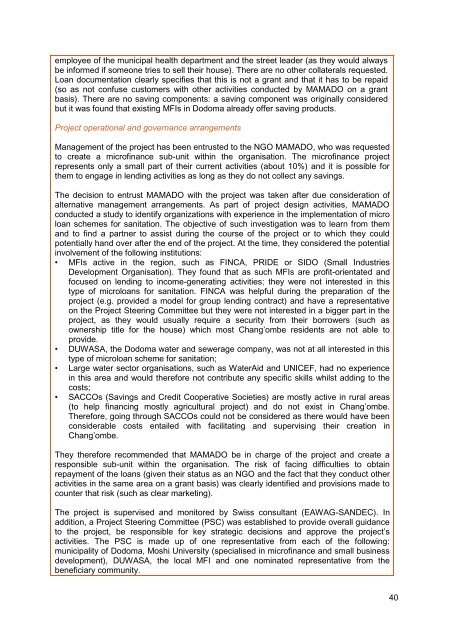REPORT__Evaluating_the_potential_of_microfinance_for_sanitation_in_Tanzania_May_2013
REPORT__Evaluating_the_potential_of_microfinance_for_sanitation_in_Tanzania_May_2013
REPORT__Evaluating_the_potential_of_microfinance_for_sanitation_in_Tanzania_May_2013
Create successful ePaper yourself
Turn your PDF publications into a flip-book with our unique Google optimized e-Paper software.
employee <strong>of</strong> <strong>the</strong> municipal health department and <strong>the</strong> street leader (as <strong>the</strong>y would always<br />
be <strong>in</strong><strong>for</strong>med if someone tries to sell <strong>the</strong>ir house). There are no o<strong>the</strong>r collaterals requested.<br />
Loan documentation clearly specifies that this is not a grant and that it has to be repaid<br />
(so as not confuse customers with o<strong>the</strong>r activities conducted by MAMADO on a grant<br />
basis). There are no sav<strong>in</strong>g components: a sav<strong>in</strong>g component was orig<strong>in</strong>ally considered<br />
but it was found that exist<strong>in</strong>g MFIs <strong>in</strong> Dodoma already <strong>of</strong>fer sav<strong>in</strong>g products.<br />
Project operational and governance arrangements<br />
Management <strong>of</strong> <strong>the</strong> project has been entrusted to <strong>the</strong> NGO MAMADO, who was requested<br />
to create a micr<strong>of</strong><strong>in</strong>ance sub-unit with<strong>in</strong> <strong>the</strong> organisation. The micr<strong>of</strong><strong>in</strong>ance project<br />
represents only a small part <strong>of</strong> <strong>the</strong>ir current activities (about 10%) and it is possible <strong>for</strong><br />
<strong>the</strong>m to engage <strong>in</strong> lend<strong>in</strong>g activities as long as <strong>the</strong>y do not collect any sav<strong>in</strong>gs.<br />
The decision to entrust MAMADO with <strong>the</strong> project was taken after due consideration <strong>of</strong><br />
alternative management arrangements. As part <strong>of</strong> project design activities, MAMADO<br />
conducted a study to identify organizations with experience <strong>in</strong> <strong>the</strong> implementation <strong>of</strong> micro<br />
loan schemes <strong>for</strong> <strong>sanitation</strong>. The objective <strong>of</strong> such <strong>in</strong>vestigation was to learn from <strong>the</strong>m<br />
and to f<strong>in</strong>d a partner to assist dur<strong>in</strong>g <strong>the</strong> course <strong>of</strong> <strong>the</strong> project or to which <strong>the</strong>y could<br />
<strong>potential</strong>ly hand over after <strong>the</strong> end <strong>of</strong> <strong>the</strong> project. At <strong>the</strong> time, <strong>the</strong>y considered <strong>the</strong> <strong>potential</strong><br />
<strong>in</strong>volvement <strong>of</strong> <strong>the</strong> follow<strong>in</strong>g <strong>in</strong>stitutions:<br />
• MFIs active <strong>in</strong> <strong>the</strong> region, such as FINCA, PRIDE or SIDO (Small Industries<br />
Development Organisation). They found that as such MFIs are pr<strong>of</strong>it-orientated and<br />
focused on lend<strong>in</strong>g to <strong>in</strong>come-generat<strong>in</strong>g activities; <strong>the</strong>y were not <strong>in</strong>terested <strong>in</strong> this<br />
type <strong>of</strong> microloans <strong>for</strong> <strong>sanitation</strong>. FINCA was helpful dur<strong>in</strong>g <strong>the</strong> preparation <strong>of</strong> <strong>the</strong><br />
project (e.g. provided a model <strong>for</strong> group lend<strong>in</strong>g contract) and have a representative<br />
on <strong>the</strong> Project Steer<strong>in</strong>g Committee but <strong>the</strong>y were not <strong>in</strong>terested <strong>in</strong> a bigger part <strong>in</strong> <strong>the</strong><br />
project, as <strong>the</strong>y would usually require a security from <strong>the</strong>ir borrowers (such as<br />
ownership title <strong>for</strong> <strong>the</strong> house) which most Chang’ombe residents are not able to<br />
provide.<br />
• DUWASA, <strong>the</strong> Dodoma water and sewerage company, was not at all <strong>in</strong>terested <strong>in</strong> this<br />
type <strong>of</strong> microloan scheme <strong>for</strong> <strong>sanitation</strong>;<br />
• Large water sector organisations, such as WaterAid and UNICEF, had no experience<br />
<strong>in</strong> this area and would <strong>the</strong>re<strong>for</strong>e not contribute any specific skills whilst add<strong>in</strong>g to <strong>the</strong><br />
costs;<br />
• SACCOs (Sav<strong>in</strong>gs and Credit Cooperative Societies) are mostly active <strong>in</strong> rural areas<br />
(to help f<strong>in</strong>anc<strong>in</strong>g mostly agricultural project) and do not exist <strong>in</strong> Chang’ombe.<br />
There<strong>for</strong>e, go<strong>in</strong>g through SACCOs could not be considered as <strong>the</strong>re would have been<br />
considerable costs entailed with facilitat<strong>in</strong>g and supervis<strong>in</strong>g <strong>the</strong>ir creation <strong>in</strong><br />
Chang’ombe.<br />
They <strong>the</strong>re<strong>for</strong>e recommended that MAMADO be <strong>in</strong> charge <strong>of</strong> <strong>the</strong> project and create a<br />
responsible sub-unit with<strong>in</strong> <strong>the</strong> organisation. The risk <strong>of</strong> fac<strong>in</strong>g difficulties to obta<strong>in</strong><br />
repayment <strong>of</strong> <strong>the</strong> loans (given <strong>the</strong>ir status as an NGO and <strong>the</strong> fact that <strong>the</strong>y conduct o<strong>the</strong>r<br />
activities <strong>in</strong> <strong>the</strong> same area on a grant basis) was clearly identified and provisions made to<br />
counter that risk (such as clear market<strong>in</strong>g).<br />
The project is supervised and monitored by Swiss consultant (EAWAG-SANDEC). In<br />
addition, a Project Steer<strong>in</strong>g Committee (PSC) was established to provide overall guidance<br />
to <strong>the</strong> project, be responsible <strong>for</strong> key strategic decisions and approve <strong>the</strong> project’s<br />
activities. The PSC is made up <strong>of</strong> one representative from each <strong>of</strong> <strong>the</strong> follow<strong>in</strong>g:<br />
municipality <strong>of</strong> Dodoma, Moshi University (specialised <strong>in</strong> micr<strong>of</strong><strong>in</strong>ance and small bus<strong>in</strong>ess<br />
development), DUWASA, <strong>the</strong> local MFI and one nom<strong>in</strong>ated representative from <strong>the</strong><br />
beneficiary community.<br />
40


